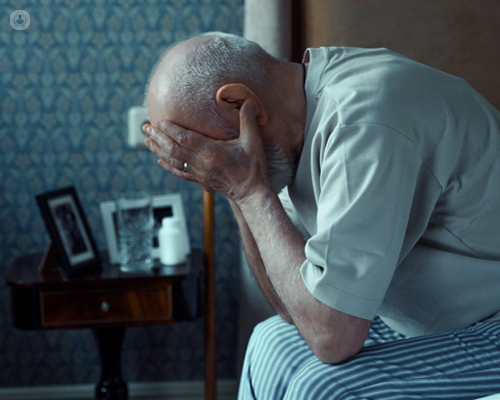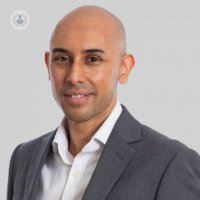What causes sleep apnoea, and how is it treated?
Escrito por:
Sleep apnoea is where breathing repeatedly stops and starts during sleep. It can significantly impact quality of life and lead to serious health problems if left untreated. Understanding its causes and how it's treated can assist in managing sleep apnoea effectively.

What causes sleep apnoea?
There are two main types: obstructive sleep apnoea (OSA) and central sleep apnoea (CSA).
- Obstructive sleep apnoea (OSA):
OSA is the most common form and occurs due to a temporary blockage of the upper airway either from excess obstructing tissue mass and/or the muscles in the throat relaxing excessively during sleep. Common causes and risk factors include:- Excess weight: Fat deposits around the neck and tongue can narrow the airway.
- Age: Muscle tone decreases with age, increasing the likelihood of obstruction.
- Nasal blockage: Causes mouth breathing and exacerbates collapse of the tongue base over the airway.
- Genetics: A naturally narrow airway or a relatively large tongue, palate and tonsils will partially obstruct the airway.
- Lifestyle factors: Smoking, excess alcohol consumption and sedative use can contribute to airway relaxation.
- Central sleep apnoea (CSA):
This isn’t as common, and happens when the brain doesn’t send proper signals to the muscles of breathing. Causes include:- Neurological conditions: Stroke or brain injury can disrupt normal breathing signals.
- Certain medications: Opioids or sedatives may suppress the central nervous system.
How is sleep apnoea treated?
It depends on the severity and the underlying cause. Options include lifestyle changes, medical devices and surgery.
- Lifestyle modifications:
This can assist in reducing symptoms, especially when it comes to mild cases of sleep apnoea:- Weight loss: Reduces external pressure on the airway.
- Avoiding alcohol and sedatives: Prevents excessive muscle relaxation.
- Sleeping position adjustments: Sleeping on the side instead of the back can help keep the airway open and stop the tongue falling back.
- Medical devices:
- Continuous positive airway pressure (CPAP): A CPAP machine delivers a constant stream of air to keep the airway open during sleep. It is the current gold standard for treating moderate to severe OSA, but may not be tolerated by many patients.
- Oral appliances: Custom-fitted devices can reposition the jaw to prevent airway collapse.
- Nasal dilators and mouth "sleep" tape: If a patient can tolerate it, these will encourage mouth closure and opening of the airway behind the tongue base.
- Surgical treatments:
For patients who do not respond to other treatments, surgery may be considered. Options include:- Tonsillectomy and palate surgery, such as uvulopalatopharyngoplasty (UPPP) or expansion pharyngoplasty: Removes and tightens excess throat tissue in order to widen the airway.
- Nasal surgery: Corrects structural issues such as a deviated septum and nasal polyps.
- Transoral robotic surgery: Is especially useful to remove enlarged tissue at the base of the tongue.
- Hypoglossal nerve stimulation: A device implanted in the neck stimulates the nerves of the tongue musculature to open up and maintain airway muscle tone, during sleep.
- Treatment for central sleep apnoea:
Managing CSA often involves addressing the underlying cause, such as neurological conditions. A neurologist will guide the management, which is often complex and may require a special ventilation machine to regulate breathing patterns.
Why is early treatment important?
Chronically untreated sleep apnoea can lead to serious complications, including high blood pressure, heart disease, stroke, and poor mental health.
If you or a loved one are experiencing symptoms like loud snoring, gasping during sleep, or excessive daytime fatigue, consult a healthcare professional to explore diagnostic and treatment options. Early intervention can greatly improve sleep quality and overall health.


